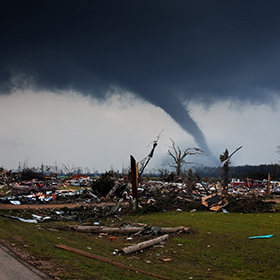How Increasing Catastrophes Impact Builders Risk Agents



It seems more and more we're hearing about catastrophes and the impact they have on the world around us. To break down how things are changing and what insurance agents should expect, we sat down with US Assure’s SVP, Head of Product Underwriting, Rachele Holden.
Q: What conditions would you consider under the umbrella of "weather catastrophe?"
A: I mean, that could be anything from earthquakes, floods, hail, tsunamis, wind, tornadoes, a catastrophe actually means that it's covering an array of certain areas of acres or counties.
Q: What are some of the greatest challenges that face insurance agents in light of those changing weather conditions?
A: Wrapping your head around how things are changing. You can start by Google searching some of these patterns, even the types of weather conditions that are happening. You're getting hailstorms now in areas that we never got hail before. Tornadoes are more frequent in other areas. Lightning storms, you know, freeze losses. Mother Nature is playing havoc every day for the past few years. So, if the agents get educated on the amount of where it's all happening, all that information helps them educate their insureds — which really are their partners. Just like we’re the agents’ partners, the insureds are their partners as well. So, let's get them the education they need.
Q: What are some resources that agents can use to emphasize the need for proper coverage?
A: You know, there's all kinds of stuff out there that's free. You've got Stormersite that will give you all the hailstorms and the tornado information. It's by city, it's by state. It tells you how many they've had in a year. You've got earthquake and earth movement. Well, there's an earthquake tracker so you can put in the city, in the state, and you can find out how many earthquakes have occurred. They actually have a diameter of color codes and tells you how close in each area that the earthquakes have hit, because that's what the underwriters are going to be looking at. They're looking at the history and the potential. You've also got Home Facts, which gives you a list of earthquakes, tornadoes, the winds and everything. ProMetrix will give you how many fire hydrants, how close to the fire department is it, and also gives you the crime rating. Is it protected? Is it not protected? It gives you a lot of information.
Q: The purchasers of insurance are changing from just contractors to commercial and residential property owners, right?
A: Yes, I would say we're probably looking at our book. I would say we're getting 50 / 50. Fifty percent of our apps are going to builders, then the other half is from the actual homeowners.
Q: Where does that leave the role of the agent?
A: I think the agent now has more due diligence for education. If your insured is the builder, he knows what all these definitions mean and what it means to have delays, coverage, and everything else. Your homeowner doesn't know this. They likely don't have any insurance knowledge. You need to train them. Walk them through the coverage forms, explain special conditions, exclusions in the policy. Define differences in losses, how the deductibles work, how they're calculated, what does it mean to be occupied. This will help prepare them in the event of a claim. They'll be more familiar with what a claims adjuster is asking for and understand where to find important details in their coverage form.
Q: Part of this due diligence must be to explore the protection in the marketplace. What's an example of differing coverages between carriers?
A: You know, that can be an array of everything. Each carrier has proprietary forms, underwriting guidelines and rating. So, they're naturally going to have their own endorsements and conditions. You need to compare the carriers and determine the conditions, exclusions and deductibles. When does coverage end and begin? Review those conditions first and find the best of the best, then rating and pricing. You always want to make sure you've secured the right coverage for your insured.
Q: How are these catastrophes impacting the role of the agent?
A: I can think of a recent example with Hurricane Ian. This major hurricane shut down some of our agencies, they lost their buildings, suffered major damages and some simply couldn't enter into the area. So, not only did their insured suffer in their area, they experienced losses themselves. I think that leaves agents needing to look closely at carriers, see what their opportunity is. You need to know whether they will be there for you. Maybe they could help you get through the endorsing or the issuance, maybe reporting a claim for you. That's always a great help. I think agents are also more understanding of everything that this poor insured is going through. Their anxiety. They're impatient because they want something done. You can walk them through the process, how long it could take and what would the delays might be so they feel prepared and heard.
Q: One of the many ways agents can help their insureds is through navigating policy details. One of the details we’re asked about a lot is percentage deductibles. Tell us about those.
A: That’s a big one for our program. We have two coverage forms. The online form is for residential and small commercial, and that percent deductible can be applied to wind and hail, flood, earthquake. Then on the large form, we have wind and hail, flood, earthquake as well. But the forms are different. On the online issuance form, the percentage deductible is calculated off of the value you insured your project for. So, if I insured it for $2 million and I have a 1% deductible, that’s a $20,000 deductible. But, on your large commercial, it’s calculated from values at risk. So, if I’m only 20% into the value, that’s what will determine the deductible, not the $2 million. If you're writing builders risk with other carriers, read the form and make sure you understand how it's calculated. Having a $1000 deductible or have a $25,000 wind and hail deductible makes a big difference to an insured.
Q: Let's talk about when the rubber hits the road. Claims. What might help the insured know what to expect when the claim adjuster calls them?
A: The claims adjuster will ask for supplemental information. For thefts, it might be receipts for the materials. If they need to determine when the start date is, they'll ask for a receipt of the foundation being poured. The construction cost breakdown is going to help the claims adjuster determine that the value was insured properly. The may also ask you to fill out some forms about the loss, the estimated amount and so on. They'll sometimes also ask the insured to join a recorded call. The quicker that they get this information, the quicker the adjustment, determination of coverage and the payment of the claim can go. In fact, when you’re completing an application, get the cost breakdown and keep it in your file. When you report a claim, it will speed up the process as the adjusters will already have one item prepared.
The market has changed. The world around us is changing. But there are steps that you can take to not only prepare yourself, but prepare your clients for what's coming next.
This is intended as a general description of certain types of insurance and services available to qualified customers. Any description of policy provisions is meant to give a broad overview of coverages and does not revise or amend a policy. Refer to the policy coverage form for a complete representation of the scope of coverage, terms, conditions, exclusions and more. The policy is the contract that specifically and fully describes your coverage. Some products may not be available in all states and may only be offered on a non-admitted basis. Product availability is subject to change.











